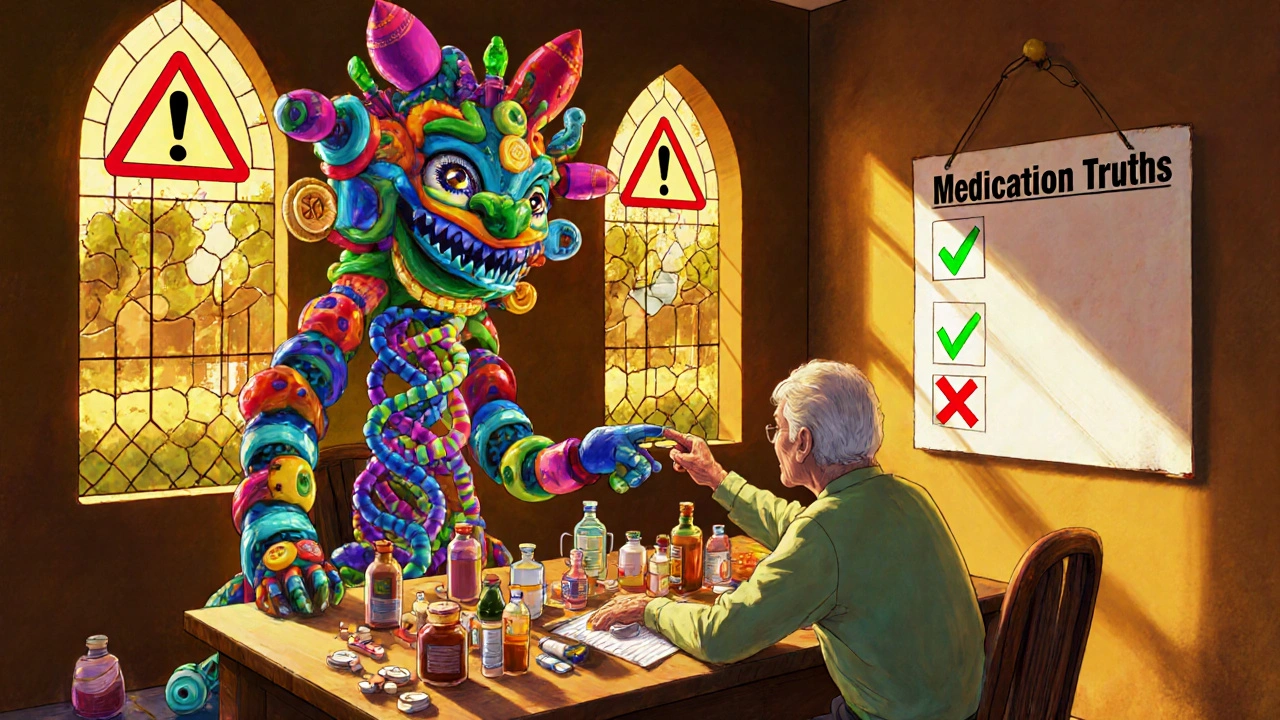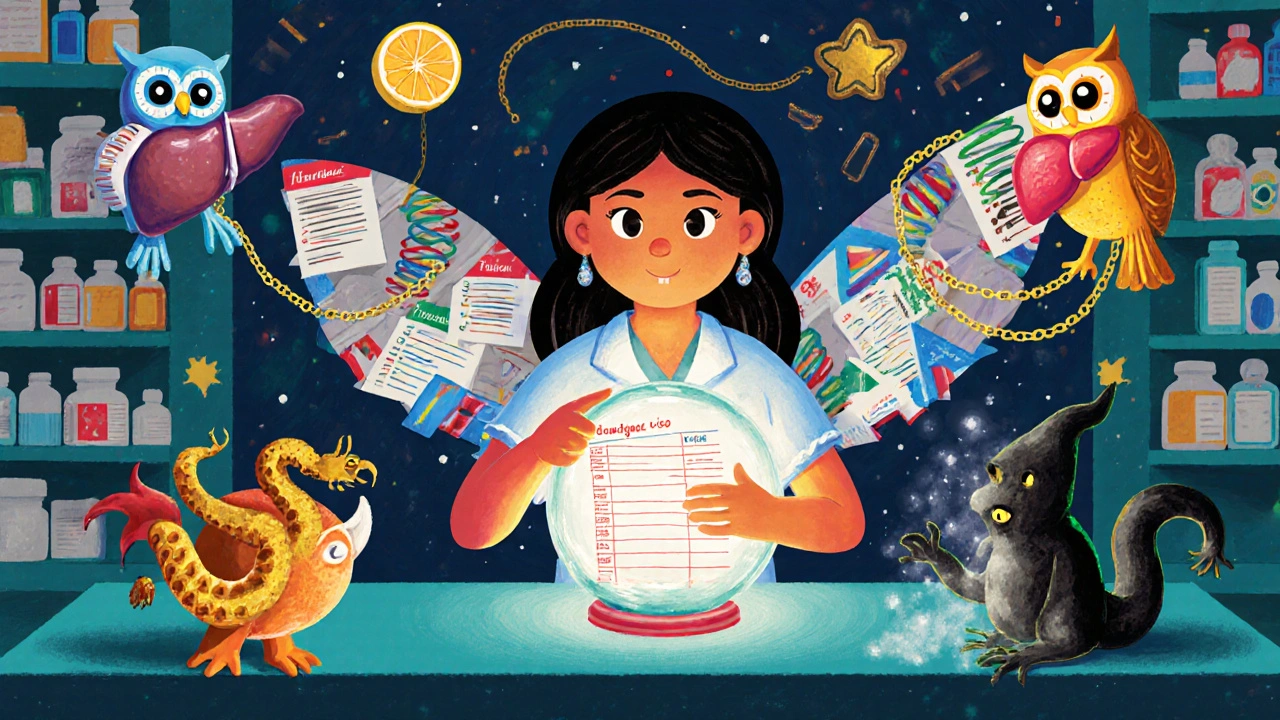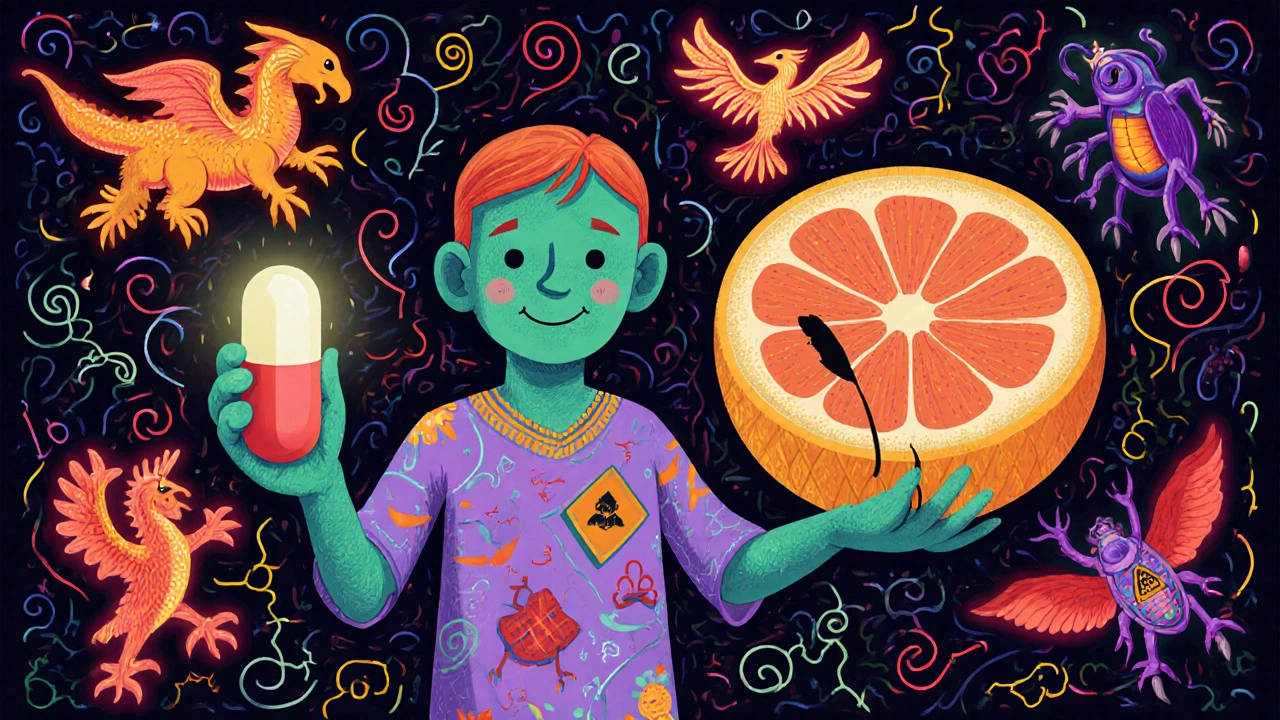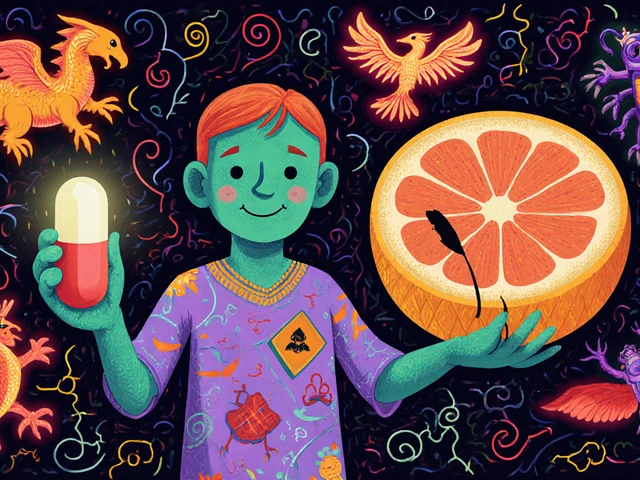Chemotherapy Drug Interaction Checker
Check Your Medications for Potential Interactions
This tool helps identify potential interactions between your medications, supplements, and common chemotherapy drugs. Note: This is not a substitute for professional medical advice. Always consult your oncologist or pharmacist before making changes to your medication regimen.
When you're undergoing chemotherapy, every pill, supplement, or even a piece of fruit can matter more than you think. It’s not just about killing cancer cells-it’s about making sure the drugs work the way they’re supposed to without causing harm. But here’s the hard truth: chemotherapy drug interactions are far more common-and dangerous-than most patients realize. One in two people on outpatient chemo experiences at least one potential interaction. And in some cases, those interactions can be life-threatening.
Why Chemotherapy Interactions Are Different
Not all drugs interact the same way. With chemotherapy, the stakes are higher because these drugs are designed to be powerful, even toxic. They don’t just target cancer-they can damage healthy cells too. When another drug, supplement, or food changes how your body handles chemo, the balance shifts. That’s when side effects get worse, or worse yet, the treatment stops working. There are three main types of interactions that matter most in cancer care:- Pharmacokinetic: This is about how your body absorbs, breaks down, or gets rid of the drug. Most often, this happens through the liver’s CYP450 enzyme system. If two drugs fight over the same enzyme, one can build up to dangerous levels-or get cleared too fast to be effective.
- Pharmacodynamic: This is when two drugs affect the same part of your body. For example, if you’re on a chemo that harms your kidneys and you also take ibuprofen, the damage adds up. That’s not just a side effect-it’s a preventable injury.
- Immunological: Newer treatments like immune checkpoint inhibitors (ICIs) can trigger strange reactions when mixed with other meds. These aren’t traditional drug interactions-they’re immune system overreactions. Some patients have developed severe liver damage or skin conditions like Stevens-Johnson Syndrome after combining ICIs with common drugs.
The Biggest Culprits: Supplements, Food, and Common Meds
You might think herbal supplements are harmless because they’re "natural." But that’s a myth. In fact, the FDA doesn’t test them the same way it tests prescription drugs. Many contain unlisted ingredients, and their potency varies wildly from bottle to bottle. Here’s what’s most dangerous when mixed with chemo:- Grapefruit and Seville oranges: These contain furanocoumarins, which permanently block the CYP3A4 enzyme. That enzyme breaks down more than half of oral chemo drugs. One grapefruit can cause drug levels to spike for days. Even a single glass of juice can be risky.
- Herbal supplements: Turmeric, ginger, ginkgo, garlic, fish oil, and vitamin E all thin the blood. If you’re on chemo that lowers platelets-or if you’re scheduled for surgery-this can lead to dangerous bleeding. Black cohosh and dong quai can interfere with hormone-based treatments like tamoxifen.
- Over-the-counter painkillers: Ibuprofen and naproxen aren’t just for headaches. They can increase kidney damage from drugs like cisplatin. Acetaminophen (Tylenol) is safer, but even that can be risky if your liver is already stressed by chemo.
- Antidepressants: Some SSRIs, like paroxetine and fluoxetine, interfere with tamoxifen’s activation in the liver. For breast cancer patients, this could mean the drug doesn’t work at all. One in eight American women will get breast cancer. One in eight take an antidepressant. The overlap is real-and deadly if ignored.
Age and Polypharmacy Make It Worse
Cancer doesn’t just affect older people-but most people with cancer are older. The American Cancer Society says 60% of diagnoses happen in people 65 and older. And that group? They’re usually taking five or more medications. That’s called polypharmacy-and it’s a perfect storm for interactions. As we age, our liver and kidneys don’t work as well. That means drugs stick around longer. A dose that was safe at 50 can become toxic at 75. A 2014 study of 244 elderly cancer patients found that 75% had potential for serious drug interactions. Most didn’t even know they were at risk. And it’s not just pills. Some patients take multiple supplements thinking they’ll help with fatigue or nausea. But studies show many of these products contain hidden ingredients or aren’t even what the label says. One study found nearly 20% of herbal supplements were contaminated with prescription drugs or heavy metals.
Oral Chemo Is Changing the Game
Twenty years ago, most chemo was given in the hospital through an IV. Now, about 25% of new chemo drugs are taken by mouth. That’s a big shift. It means patients are managing powerful drugs at home-without nurses watching over them. Oral chemo drugs like capecitabine, lenalidomide, or ibrutinib are just as dangerous as IV drugs. But because they’re taken daily, interactions happen more often. A missed dose? A supplement you started last week? A cold medicine you grabbed without thinking? All of it matters. The problem? Most patients don’t tell their oncologist about everything they’re taking. They assume supplements are safe. Or they forget to mention that they’re taking melatonin for sleep or turmeric for joint pain. But those little things? They can change everything.What You Need to Do-Right Now
If you’re on chemotherapy, here’s what you need to do, no exceptions:- Make a full list. Write down every prescription, over-the-counter drug, vitamin, herb, and even tea you drink daily. Include doses and how often you take them.
- Bring it to every appointment. Don’t just tell your doctor-show them the bottles. Pharmacists can scan barcodes and check for interactions in seconds.
- Ask about grapefruit. If you love it, ask if it’s safe with your specific chemo. If your drug is metabolized by CYP3A4, avoid it completely.
- Stop all supplements before surgery. If you’re having a procedure, stop blood-thinning supplements like fish oil, garlic, or ginkgo at least 10 days before. Ask your care team for a full list of what to pause.
- Use trusted tools. Pharmacies use Lexicomp or Micromedex to check interactions. Ask your pharmacist to run your full list through one of these systems. They’re trained for this.
What Your Care Team Should Be Doing
Doctors can’t catch everything. That’s why pharmacists are now essential members of cancer care teams. In top cancer centers, clinical pharmacists review every patient’s medication list before chemo starts. They flag high-risk interactions and suggest alternatives. For example:- If you’re on tamoxifen and taking an SSRI, they might switch you to venlafaxine, which doesn’t interfere.
- If you’re on ibrutinib and need pain relief, they’ll avoid NSAIDs and recommend acetaminophen instead.
- If you’re on an immune checkpoint inhibitor and taking statins, they’ll monitor liver enzymes closely-and may pause the statin if signs of hepatitis appear.

The Future: Personalized Interaction Risk
The next big step isn’t just avoiding bad combinations-it’s predicting who’s at risk before they even start treatment. Researchers are now looking at genetic testing to see how fast your liver breaks down drugs. Some people have a CYP2D6 gene variant that makes them slow metabolizers. For them, a standard dose of tamoxifen might be too strong. Other studies are testing "desensitization" protocols-giving small, controlled doses of a problematic drug to help the immune system tolerate it. This could one day let patients keep life-saving meds even if they previously had a reaction. But for now, the best defense is simple: know what you’re taking. Tell your team everything. Don’t assume anything is safe.What Happens If You Ignore This?
A 2001 study found that drug interactions contributed to 4% of deaths in hospitalized cancer patients. That’s not a small number. That’s 1 in 25 people who died because something they took-maybe a supplement, maybe a cold pill-made their chemo toxic. And it’s not just death. It’s hospitalizations. It’s delayed treatments. It’s chemo cycles canceled because your liver failed. It’s radiation postponed because your platelets dropped too low. You’re fighting cancer. Don’t let a bottle of turmeric or a glass of grapefruit juice be the thing that costs you your chance.Can I take vitamins while on chemotherapy?
Some vitamins are fine, but many can interfere. High-dose antioxidants like vitamin C or E might protect cancer cells from chemo’s damage. Vitamin D and B12 are generally safe, but always check with your oncology pharmacist. Never start a new vitamin without asking.
Is it safe to use CBD oil during chemo?
CBD can interact with chemo drugs metabolized by CYP3A4 and CYP2D6 enzymes, potentially increasing side effects or reducing effectiveness. There’s also limited data on safety with immunotherapy. Most oncologists advise against it unless part of a monitored clinical trial.
Why can’t I take ibuprofen with chemo?
Ibuprofen and other NSAIDs can increase kidney damage from drugs like cisplatin or carboplatin. They can also lower platelet counts and increase bleeding risk, especially if your chemo already affects your blood. Acetaminophen (Tylenol) is usually a safer choice for pain or fever.
Does grapefruit affect all chemotherapy drugs?
No, but it affects many common ones-including docetaxel, paclitaxel, etoposide, and oral drugs like capecitabine and erlotinib. Since it blocks the CYP3A4 enzyme, it can cause drug levels to rise dangerously. If your chemo is taken by mouth, assume grapefruit is off-limits unless your pharmacist says otherwise.
Should I stop my supplements before surgery?
Yes. Supplements that thin the blood-like fish oil, garlic, ginkgo, ginger, and vitamin E-should be stopped at least 10 days before any surgery or procedure. Even if your oncologist didn’t mention it, ask your surgeon or pharmacist. Bleeding during surgery can be life-threatening.


Let’s be real-this article is just corporate oncology’s way of keeping you dependent. The CYP450 system? That’s been manipulated since the 80s to push patented synthetics over natural alternatives. Grapefruit? It’s been used in traditional medicine for centuries. The real danger isn’t the fruit-it’s the pharmaceutical monopoly that profits when you’re scared to eat anything without their approval. They don’t want you to know that turmeric outperforms half the chemo drugs in vitro. They just want you to keep buying.
And don’t get me started on ‘clinical pharmacists.’ Who funds them? Big Pharma. They’re not protecting you-they’re gatekeeping access to real solutions. If you’re not supplementing with high-dose vitamin C IVs and ozone therapy, you’re being played.
Read the 2018 NIH paper on flavonoid-mediated chemosensitization. It’s not in your oncologist’s training. Why? Because it doesn’t come with a patent.
Wake up. Your body isn’t broken. The system is.
Okay, so I just got off the phone with my oncologist and he told me to stop all supplements-except the ones he prescribed, which are all from Big Pharma, obviously-and now I’m terrified I’m going to die because I took a teaspoon of turmeric last Tuesday. I mean, what if it’s already too late? What if the grapefruit I had in my smoothie three weeks ago has been silently poisoning my liver and now my chemo is useless and I’m going to die alone in a hospital with a tube down my throat while they bill my insurance for ‘preventable drug interaction’? I just Googled ‘CYP3A4 grapefruit death stories’ and there’s a whole Reddit thread from 2019 where a guy’s mom died and the hospital refused to admit the interaction was the cause. I’m not even sure I can trust my own pharmacist anymore. I think they’re all on payroll. I think my entire medical history has been tampered with. I think my blood is now just a cocktail of corporate chemicals and I’m going to wake up one day and my skin will be peeling off because of Stevens-Johnson Syndrome and no one will tell me why. I need to know: should I throw out my entire medicine cabinet? Should I move to a cabin in the woods and drink distilled rainwater? Is my cat spying on me?
Also, can you recommend a holistic healer who doesn’t work for the FDA?
Just wanted to say thank you for this. I’m a breast cancer survivor on tamoxifen and I didn’t realize paroxetine could interfere until I read this. I was taking it for anxiety and thought it was fine since my PCP said so. My oncology pharmacist flagged it during my med review last month and switched me to venlafaxine-best decision ever. No more brain fog, no more mood crashes. Also, I stopped the fish oil and ginkgo before my lumpectomy like they said and had zero bleeding issues. Honestly? I didn’t even know those were risky. I thought ‘natural’ meant safe. I was wrong. Please, if you’re on chemo, bring your pill bottles to your next appointment. Even the ones you haven’t opened. Even the ones you think are ‘just for sleep.’ They matter.
Also, grapefruit juice? Gone. I miss it, but not enough to risk it.
Good summary. Don’t guess. Ask. Show. Verify.
Pharmacokinetic modulation via CYP450 isoform inhibition-particularly CYP3A4-is a well-documented phenomenon in oncopharmacology. The furanocoumarin-mediated irreversible inhibition of intestinal and hepatic CYP3A4 by grapefruit constituents elevates systemic bioavailability of substrates such as capecitabine and erlotinib, potentially exceeding therapeutic thresholds and increasing risk of grade 3/4 toxicities. Concurrent use of NSAIDs with nephrotoxic agents like cisplatin exacerbates tubular injury via prostaglandin suppression and reduced renal perfusion. Furthermore, concomitant administration of CYP2D6 inhibitors with tamoxifen diminishes conversion to endoxifen, reducing efficacy by up to 40% in extensive metabolizers. These are not theoretical risks-they are evidence-based contraindications. Always engage a clinical pharmacist for medication reconciliation. This is not an opinion. It’s standard of care.
Y’all are stressing over grapefruit like it’s a villain in a Marvel movie 😅
Look-I’m a 62-year-old ovarian cancer patient on capecitabine. I drink grapefruit juice every morning. My oncologist knows. My pharmacist ran my med list through Lexicomp. They said: ‘It’s fine if you take it 4 hours apart from your dose.’ I do. No issues. No hospitalizations. No magic crystals needed.
Also, CBD? I use it for nausea. My oncologist monitors my liver enzymes every 2 weeks. It’s working. No drama.
Stop fearing food. Start trusting your care team. And if they’re not listening? Find new ones. But don’t let fear turn your treatment into a horror story. You’re stronger than a supplement bottle. 💪❤️
Wow. This article is 98% fearmongering dressed up as ‘education.’ Who wrote this? A pharmaceutical rep? The FDA’s PR team? The fact that they’re warning about turmeric and ginger but not mentioning that chemo itself is a Class 1 carcinogen is hilarious. And the ‘ask your pharmacist’ line? Most pharmacists are just glorified cashiers at CVS who’ve never read a peer-reviewed oncology journal. They scan barcodes and tell you to ‘take it with food.’
Meanwhile, the real issue? The medical system doesn’t want you to know that diet, fasting, and hyperbaric oxygen therapy have shown better outcomes than chemo in multiple studies. But hey, let’s keep scaring people into taking pills they don’t need while ignoring the root causes of cancer. Classic.
Also, I’ve been on chemo for 4 years. I take 12 supplements. I’m still alive. Your fear isn’t your friend. Your critical thinking is.
Statistical anomaly: 4% mortality from drug interactions in hospitalized cancer patients. But the sample size is skewed-most deaths occur in polypharmacy cohorts with advanced age, comorbidities, and non-adherence. The article conflates correlation with causation. The real issue is lack of pharmacogenomic integration into oncology workflows. CYP2D6, CYP3A5, SLCO1B1 polymorphisms are underutilized in clinical decision-making. Supplementation risks are real, but the narrative ignores systemic failures: fragmented EHRs, absence of pharmacist-led med reviews in community oncology, and lack of patient education infrastructure. This article is emotionally compelling but clinically superficial. It solves nothing.